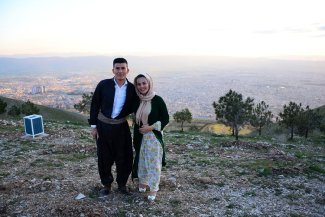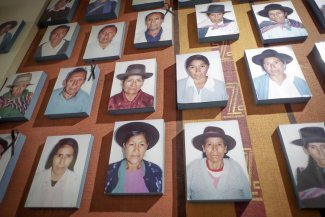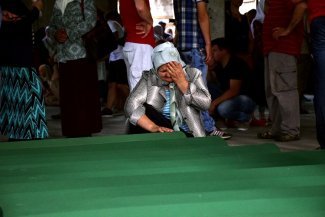The enforced abductions and disappearances of Iraqi men that have occurred for decades – whether under the regime of Saddam Hussein, during the dark days of the so-called Islamic State’s reign of terror or following anti-government protests in 2019 – continue to haunt the relatives of the disappeared. But families who seek answers receive little support.
Virtually all of the men of the village of Saqlawiya, some 50 kilometres west of Baghdad have disappeared. Sitting in the one-room house that she shares with her sister, two sons and mother, Fatima*, 31, holds a portrait of her father Ahmed, whom she hass’t seen since June 2016.
“To this day, we have no news of our men. We don’t even know if they’re alive or dead. If they were detained, we could at least visit them, but we don’t even have that possibility,” she tells Equal Times.
In addition to her father, Fatima is also trying to find out what happened to her brother, her husband and her sister’s husband. In late May 2016, Iraqi forces launched a sweeping operation to retake the city of Fallujah, located just eight kilometres from Saqlawiya and considered one of the most important strongholds of the jihadist organization, the so-called Islamic State (IS or ISIS). According to Amnesty International, a total of 643 men and boys were forcibly disappeared between 2 and 3 June 2016 by the Popular Mobilisation Units (PMU), or Hachd al-Chaabi, a paramilitary coalition of armed forces formed two years earlier after top Iranian Shia cleric Ali al-Sistani issued a call to battle against IS.
“Some of the armed groups came to our village, locked all the women in houses and took our men away,” says Fatima. “We could hear them celebrating outside as they tortured our men. They didn’t discriminate between people and didn’t hesitate to attack children.”
While the various militias comprising the PMUs have played a crucial role in Iraq’s fight against IS, some of the armed forces have themselves been accused of atrocities, including kidnapping, arbitrary imprisonment and torture against mainly Sunni populations suspected of joining or supporting the jihadist organisation.
On 5 June 2016, the office of then Prime Minister Haider al-Abadi responded by setting up a commission to investigate disappearances and other violations committed in the course of military operations to retake Fallujah. For the moment, neither the government, the commission nor the PMU command have confirmed these allegations. They are based solely on the testimony of families interviewed by various human rights NGOs.
“When I asked them what they had done to my family, one of them, who was holding a bloody sword, told me that they had come for revenge and that he intended to take the same number of people killed in the Speicher base massacre,” says Fatima, referring to the attack on a military camp by IS, which is believed to have led to the murder of between 1,095 and 1,700 Iraqi army cadets near Tikrit in June 2014.
Disappearances under Saddam Hussein and during the American invasion
The various crimes committed at Saqlawiya are part of a wider, systemic pattern of enforced disappearances since 1968 that the Committee on Enforced Disappearances (CED), a UN body that monitors the implementation of the Convention for the Protection of All Persons from Enforced Disappearance, has described as successive “waves”.
Saddam Hussein came to power with the support of the Baath Party, which had already been responsible for abuses. He established a dictatorial regime that was highly repressive towards its opponents, particularly members of the Communist Party and the Islamic Dawa Party. The Kurds were subsequently the target of the genocidal Anfal campaign that took place between February and September 1988. In its latest report, published in March 2023, the CED estimates that 250,000 people, including 100,000 Kurds, were victims of enforced disappearance over a 20-year period.
“The act of disappearance by the government or affiliated forces has long been a deeply rooted fear in Iraqi society, because it was the Baath regime’s main tool of repression,” says Razaw Salihy, Amnesty International’s Iraq researcher.
A new cycle of violence began in 2003 with the American invasion. The US army and its allies captured no fewer than 200,000 Iraqis in the first five years of their occupation. The CED report notes that many people were detained without a warrant and sometimes by mistake. At the same time, a policy of ‘de-Baathification’ and the disbanding of the Iraqi army enabled militias to gain a foothold in certain regions, which further increased tensions in the country.
“Between 2006 and 2008, sectarian conflicts between militias were particularly intense. Thousands of Iraqis, mainly men and boys, were forcibly disappeared,” says Salihy. “People crossing different governorates or even certain neighbourhoods were stopped at the checkpoint, and families haven’t heard from them to this day,” she adds.
“Virtually every family has a missing person”
The subsequent rise of IS beginning in June 2014 and ending with its territorial defeat in 2017 resulted in violent confrontations that often included war crimes, such as the genocide of the Yazidi. In addition to the many abuses committed by the jihadist group, the liberation of areas that it occupied has also been accompanied by enforced disappearances, as evidenced by the abuses in Saqlawiya.
“People of fighting age living in areas formerly occupied by ISIS have faced unprecedented stigmatisation. Tens of thousands of men and boys have been arbitrarily arrested, detained and killed,” confirms Salihy.
More recently, following the anti-government protests of 2019, in which activists were consistently targeted by government repression, it was Iraqi environmentalists who faced the threat of enforced disappearance. In February 2023, Jassim al-Asadi, co-founder and director of Nature Iraq, an NGO dedicated to protecting the environment, was kidnapped by an unidentified armed group and held for more than two weeks before being released.
Despite the scale of the phenomenon, precise figures on the total number of people who have disappeared in connection with the many conflicts that have taken place in Iraq since 1968 are lacking.
However, the Red Cross estimates that Iraq is one of the countries with the highest number of disappeared persons, with hundreds of thousands still unaccounted for after decades of war.
According to CED estimates, up to one million people in Iraq have disappeared over the last five decades. The organisation is calling for new laws to put an end to these waves of disappearances.
“In Iraq, virtually every family has a missing person, whatever their ethnic, religious or social background. We’re talking about hundreds of thousands of families affected by disappearances and as many lives that have come to a halt,” says Kushtrim Koci, deputy protection coordinator for the missing at the International Committee of the Red Cross (ICRC).
A complex legal landscape
Despite several calls by NGOs and international institutions for the Iraqi government to find solutions to the problem of enforced disappearances, the legal landscape remains highly complex, making the search for justice particularly complicated for affected families.
Although the International Convention for the Protection of All Persons from Enforced Disappearance came into force in Iraq in 2010, the relevant institutions are based both in federal Iraq and in the Kurdistan region, and the existing laws fail to take into account difficulties on the ground.
“The more time that passes between the creation of effective and coordinated national mechanisms to clarify fate and whereabouts, the more challenging the search itself will be,” says Sara Alzawqari, communications coordinator for the ICRC in Iraq.
“The search for a missing family member can continue for many years and be passed down for generations. We still receive requests from people searching for their grandfathers, fathers and uncles who disappeared in 1980s, a cousin or son who was abducted in 1991, or a couple they haven’t heard from since 2014,” she adds.
Iraq’s adoption of the Yazidi Survivors Law on 1 March 2021 has established an administrative reparation programme aimed at giving effect to survivors’ right to reparation. However, 13 organisations have criticised the government’s recent imposition of an additional requirement for survivors to file criminal complaints in order to be eligible for reparation.
In the absence of government support in finding her missing family members in Saqlawiya, Fatima decided to sell land and furniture in order to hire a lawyer. After filling her with false hope, he fled without fulfilling his contract.
“We did everything we could to find information about our loved ones, and now we’re left with nothing. It’s really difficult to get at any truth in this country,” she tells Equal Times. “We’re afraid that some of the culprits will come after us if we make too much noise,” she adds.
“We only live in the hope that one day they will return”
In addition to the very serious psychological effects from which they suffer, families who are unable to find their loved ones or obtain compensation face significant stigmatisation and numerous administrative difficulties.
Last February, the REACH humanitarian initiative, which provides various types of data in crisis situations, estimated that 33 per cent of female-headed households were missing civil documents.
The main barriers they face are complications linked to the need for a male guardian to make the request, the stigma attached to families living in areas controlled by IS and the inability to pay documentation fees.
“In Iraq, civil documentation is essential in exercising rights such as freedom of movement and access to basic services, employment and education,” says Alzawqari.
“These documents may have been lost, stolen, or invalidated in the course of the armed conflict and displacement. When husbands disappear, families feel abandoned,” she adds.
To address this problem, the ICRC signed a memorandum of understanding with the Iraqi Bar Association in February 2023 to coordinate activities to help the 27,000 families of the missing registered with the ICRC in Iraq with their legal and administrative needs.
Meanwhile, the difficulties that Fatima faces in obtaining civil documents mean that she is unable to send her children to school. In addition, authorities are asking her to declare her missing family members as ‘martyrs’, which would inevitably deprive her of the right to continue her search.
“I don’t want to stop searching, I don’t want to lose hope, I don’t want to declare my husband a martyr. They say that with time you forget, or that time heals. The years have gone by, but every year the wound gets deeper. You can never forget,” she says.
“It’s been many years and yet my tears keep flowing with each memory. We continue to pray every day for the safe return of the men in the family. We only live in the hope that one day they will return,” she concludes.













